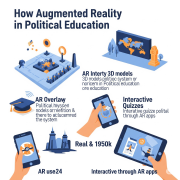How Augmented Reality Is Used in Political Education
Augmented reality (AR) is changing our view of the world and currently our perspective of politics as well. AR is becoming a potent tool for political education as digital learning tools get more immersive; it helps civic knowledge be more interesting, accessible, and influential for both students and citizens.
AR Brings Civics to Life
 AR’s capacity to visualize complicated systems is among its most fascinating uses in political education. Imagine pointing your smartphone at a U.S. Capitol poster and seeing, replete with clickable stages and video clips of historical debates, a 3D animation of how a bill becomes law. AR can create engaging experiences from dull textbook material that increase learning and recall.
AR’s capacity to visualize complicated systems is among its most fascinating uses in political education. Imagine pointing your smartphone at a U.S. Capitol poster and seeing, replete with clickable stages and video clips of historical debates, a 3D animation of how a bill becomes law. AR can create engaging experiences from dull textbook material that increase learning and recall.
Interactive Education Inside Museums and Schools
AR is starting to be included in curricula and exhibits of municipal institutions as well as schools. Some history museums, for instance, now replicate important political events using AR headsets, therefore enabling students to see the signing of the Constitution or engage in simulated voting activities. This immersive storytelling gives political and historical events instant relevance.
Fighting False Information Through Involvement
Media literacy and false information awareness also benefit from AR. By simulating how false information travels on social media, interactive AR apps enable people to better grasp how echo chambers, algorithms, and bias shape political viewpoint. In a digital age, these practical teachings foster media-savvy citizenship and critical thinking.
Tools for AR Campaigns and Voter Engagement
Political campaigns are increasingly using AR to target younger voters. These techniques seek to raise participation and turnout by addressing audiences where they already are—on their phones—from interactive yard signs opening video messages from candidates to AR filters on Instagram that explain policy platforms.
Political Learning: Future Prospect
As AR technology develops, its possibilities in political education keep expanding. Augmented reality is destined to be a pillar of civic learning in the twenty-first century whether in classrooms, community centers, or campaign trails.
Intrigued about how new technology is influencing politics? Subscribe to our newsletter to learn more about AR, artificial intelligence, and how civic participation might shape itself. Alternatively look at our complete political technology coverage.

 Politics And Journalism
Politics And Journalism

